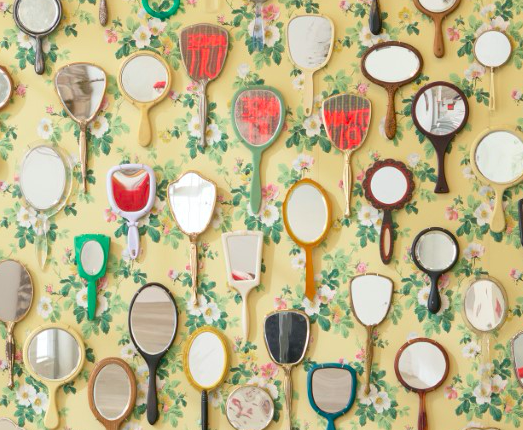Southern trees bear a strange fruit. Billie Holiday’s iconic song “Strange Fruit” serves as a haunting metaphor for racial violence, evoking the historical and ongoing pain of Black Americans. The song was originally written by Abel Meeropol in 1937 in the form of an anti-lynching protest poem. “Strange Fruit” is also the title of Genevieve Gaignard’s current solo exhibition at Vielmetter gallery. Presenting a series of installation, assemblage, and photographic works, Gaignard addresses constructs of identity that intersect race, gender, and class. By looking to the past, Gaignard interrogates hierarchical systems of representation and implicit biases embedded in American culture that continue to enable the subjugation of Black identities.
A palette of crates labeled “strange fruit” containing bright red pomegranates welcomes viewers into the gallery. Pomegranates are often depicted in art history as a symbol of fertility, and in Greek mythology, they are known as “the fruit of death,” having grown out of the blood of Adonis. The fruit’s double meaning–death and life–sets the tone of the exhibition. Notions of Black and white femininity are represented in everyday found objects often sourced from Gaignard’s familial and childhood archives. The daughter of interracial parents, Gaignard examines her own intersectional identity in a series of photographs titled “Off With Their Heads.” Dressed as one of the Southern Gothic Royal Doulton figurines included in the surrounding installation (in the form of severed heads delicately resting on pedestals), Gaignard performs white historical concepts of beauty that appear kitschy and absurd. An installation of tightly staggered mirrors on vintage wallpaper titled Do You Only Want to See What You Believe? brings to mind W. E. B. Du Bois’ concept of double consciousness in their fragmented reflections. The mirrors summon Toni Morrison’s novel The Bluest Eye, which tells the story of a Black girl who spends long hours looking in the mirror. Clouded by racist ideals, the girl struggles to recognize her own Black beauty. The mirrors also prompt the viewer to look at themselves—to turn inwards and ask, Do you only want to see what you believe? Viewers are encouraged to examine their own identities, values, and potential complicity. By turning to the past, Gaignard reminds us that America is still sick—with blood on the leaves and blood at the root.
Vielmetter Los Angeles
1700 S Santa Fe Ave #101
Los Angeles, CA 90021
On view through May 7, 2022


